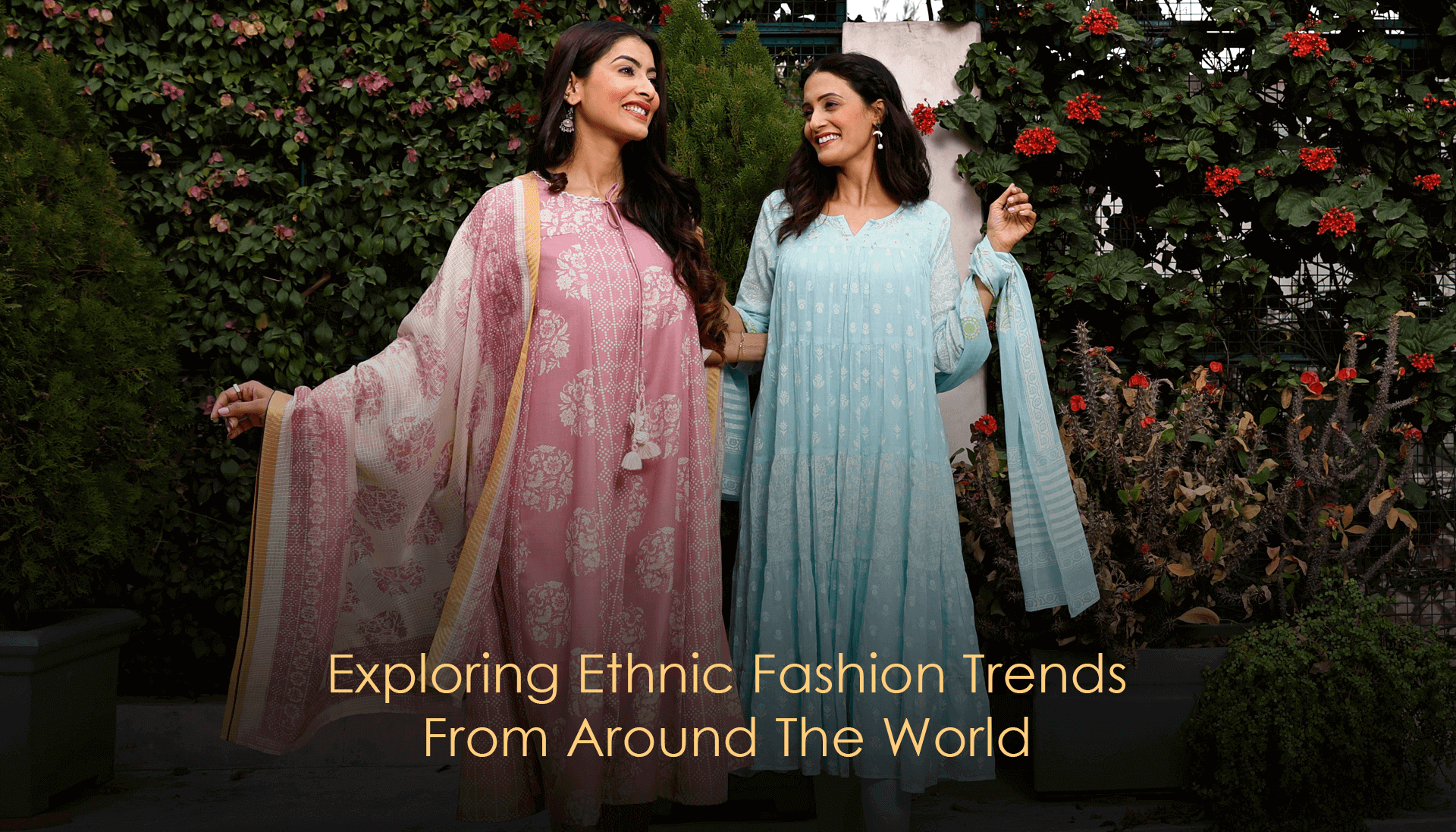The Rise Of Sustainable And Ethical Ethnic Fashion
Fashion has the power to tell stories, celebrate cultures, and inspire change. In recent years, a new movement has emerged within the fashion industry – the rise of sustainable and ethical ethnic fashion. This movement embodies a commitment to preserving traditional craftsmanship, supporting local artisans, and embracing eco-friendly practices. In this blog post, we will explore the intersection of sustainability and ethnic fashion, highlighting the significance of conscious choices, the beauty of traditional techniques, and the global trends that are shaping the industry.
The Need for Change:

The fashion industry's environmental impact and ethical concerns have sparked a growing demand for change. Fast fashion's detrimental effects on the environment, exploitation of workers, and cultural appropriation have led consumers to seek alternatives. This has paved the way for the rise of sustainable and ethical fashion, where the focus is on reducing waste, promoting fair-trade practices, and respecting cultural heritage.
Embracing Conscious Choices:

Sustainable and ethical ethnic fashion encourages consumers to make conscious choices by investing in timeless pieces made from eco-friendly materials. Designers are utilizing organic fabrics, recycled materials, and natural dyes to reduce the environmental footprint of their creations. By opting for quality over quantity, consumers can build a wardrobe that is both stylish and sustainable.
Preserving Traditional Craftsmanship:

One of the pillars of sustainable and ethical ethnic fashion is the preservation of traditional craftsmanship. Many communities around the world possess unique techniques passed down through generations. By collaborating with indigenous artisans and craftsmen, designers can create authentic pieces that celebrate cultural heritage. This collaboration not only supports local economies but also ensures the survival of these traditional skills.
Supporting Fair-Trade Practices:

Ethical fashion encompasses fair-trade practices that prioritize the well-being of workers and artisans. By partnering with fair-trade organizations and cooperatives, designers ensure that the individuals involved in the production process receive fair wages and safe working conditions. This empowers artisans, promotes social equality, and helps break the cycle of exploitation often associated with the fashion industry.
Cultivating Cultural Preservation:

Sustainable and ethical ethnic fashion is rooted in the preservation of cultural heritage. Designers are increasingly embracing traditional textiles, patterns, and motifs, infusing them into contemporary designs. These fusion honours the rich history and craftsmanship of diverse cultures, showcasing their beauty to a global audience. By valuing and promoting cultural preservation, the fashion industry becomes a platform for inclusivity and celebration of diversity.
Global Trends and Influences:

The rise of sustainable and ethical ethnic fashion has not gone unnoticed in the global fashion scene. Influential designers, fashion houses, and celebrities are championing these values and incorporating them into their collections. This shift in mindset is reflected in runway shows, magazine editorials, and red-carpet events, where sustainable and ethical fashion choices are being celebrated and embraced.
Educating Consumers:

To truly transform the fashion industry, education and awareness are key. Consumers play a crucial role in driving change by making informed choices. By educating themselves about sustainable and ethical fashion practices, consumers can become empowered advocates for positive change. This includes understanding the impact of their purchasing decisions, supporting brands with transparent supply chains, and encouraging others to embrace conscious fashion choices.
Innovative Approaches: Technology and Sustainable Fashion:

In the realm of sustainable and ethical ethnic fashion, technology is playing a pivotal role in driving innovation. From 3D printing to digital textile printing, advancements in technology have opened up new possibilities for sustainable fashion production. Designers are exploring these tools to reduce waste, create custom-fit garments, and experiment with alternative materials. Additionally, blockchain technology is being utilized to ensure transparency and traceability in the supply chain, allowing consumers to make more informed choices about the origins and ethical practices behind their clothing.
Collaborations with Indigenous Communities:

A significant aspect of sustainable and ethical ethnic fashion is fostering partnerships with indigenous communities. By collaborating directly with these communities, designers can gain a deeper understanding of their cultural traditions, techniques, and the importance of preserving their heritage. Through these collaborations, designers can co-create collections that not only showcase the richness of indigenous cultures but also provide economic opportunities and empower local artisans. This approach helps to ensure that the benefits of the fashion industry are shared more equitably.
Fashion as a Catalyst for Social Change:

Sustainable and ethical ethnic fashion has the potential to be a catalyst for social change beyond the realm of fashion itself. By embracing diverse cultural influences and supporting marginalized communities, this movement promotes inclusivity and challenges the dominant narratives within the fashion industry. Furthermore, sustainable fashion practices often align with broader social and environmental movements, such as gender equality, fair labor rights, and climate action. Through conscious fashion choices, individuals can actively contribute to creating a more equitable and sustainable world.
The Role of Education and Advocacy:

Education and advocacy play a crucial role in promoting sustainable and ethical ethnic fashion. Fashion schools and educational institutions are incorporating sustainability into their curricula, equipping the next generation of designers with the knowledge and skills to create a positive impact. Additionally, fashion activists, bloggers, and influencers are raising awareness and promoting sustainable fashion through social media platforms and campaigns. By sharing information, highlighting sustainable brands, and encouraging open discussions, these voices amplify the message of conscious fashion choices to a wider audience.
The Future of Sustainable and Ethical Ethnic Fashion:
As the demand for sustainable and ethical fashion continues to grow, the future of ethnic fashion looks promising. The industry is witnessing a shift towards circularity, with initiatives such as clothing rental, upcycling, and second-hand markets gaining momentum. Moreover, advancements in textile recycling and innovations in sustainable materials are paving the way for a more environmentally friendly fashion industry. The collaboration between fashion brands, policymakers, and consumers will be crucial in driving systemic change and establishing sustainable practices as the norm rather than the exception.
The rise of sustainable and ethical ethnic fashion marks a turning point in the fashion industry's journey toward sustainability and social responsibility. By embracing conscious choices, supporting traditional craftsmanship, and promoting cultural preservation, this movement paves the way for a more inclusive and responsible fashion future. As consumers, we hold the power to shape this industry by supporting brands that align with our values and demanding transparency and accountability. Let us celebrate the beauty of ethnic fashion while embracing sustainability and ethics, as together we create a fashion world that not only looks good but also does good.


